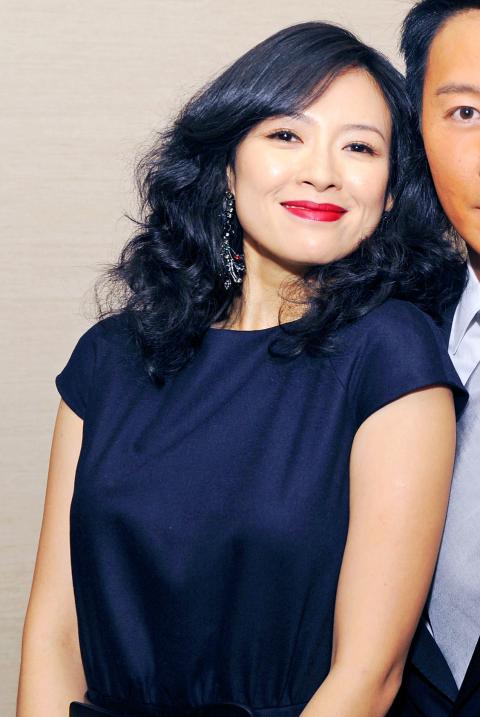Zhang Ziyi (章子怡) has dominated the gossip pages since reports broke that the Chinese actress allegedly took millions of US dollars in exchange for encounters with Bo Xilai (薄熙來). Zhang took to her blog to deny that she had prostituted herself to the scandal-ridden former mayor and governor and other politicians and business leaders, but is reportedly under investigation by the Chinese government and forbidden to leave the country. The rumors were supposedly lent credence by Zhang’s absence from the Cannes Film Festival premiere of her latest flick Dangerous Liaisons (危險關係).
Other high-powered men who reportedly paid to sleep with Zhang include Shide Group (實德集團) founder Xu Ming (徐明), one of China’s wealthiest businessmen.
Our sister newspaper the Liberty Times reported that discussion about Zhang’s alleged side job first started on online forums in China, but was quickly shut down by the government. The Xinhua News Agency (新華通訊社) finally reported the news several days later. The article by the government’s official news agency carefully denounced the allegations as scuttlebutt, leading the Liberty Times to remark that “China’s ability to silence discussions once again renders people speechless.”

Photo: Taipei Times
The Liberty Times report also said that netizens have offered advice to Zhang: watch your back. Bo and his wife Gu Kailai (谷開來) are not only under investigation in connection with the death of British businessman Neil Heywood, but one of Bo’s rumored mistresses, anchorwoman Zhang Weijie (張偉杰), disappeared under mysterious circumstances after Gu discovered the dalliance.
Before news of the Zhang-Bo scandal broke, other celebrities managed to enjoy a few minutes in the spotlight this week. Zhang’s Dangerous Liaisons co-star Cecilia Cheung (張?芝) was forced to cancel a press conference after suffering a bout of food poisoning, but was in good spirits at a make-up session with the media.
Ticket sales for the actress’ most recent films have floundered since her acrimonious split from actor Nicholas Tse (謝霆鋒), but Cheung said being dubbed “box office poison” by the press did not bother her.

Photo: Taipei Times
“I never think of the box office. I only think of doing a good job with my character,” Cheung claimed. “The box office is for my bosses to worry about.”
Her handlers called for a 10-minute break after reporters brought up the topic of Cheung’s love life, but she continued to answer questions.
When a reporter grilled her about the possibility of a reunion with Tse even though their divorce was just finalized last month, Cheung replied “If the love is still there, even if two people are headed in different directions at the moment, it is certain that they will eventually return to one another.”
Tse spent time with the couple’s sons while his ex-wife was filming abroad. The Liberty Times reported that he also spent time with a comely young woman. Tse and his unnamed companion were spotted enjoying a vigorous two-hour-long game of badminton.
Jolin Tsai’s (蔡依林) love life is usually under as much scrutiny as Cheung and Tse’s, but this week she managed to deflect attention from her relationships by sharing a disciplinary note she received as a high school student.
The slip reprimanded the teenage Tsai for not keeping her uniform within school regulations. Tsai disclosed that the offending article was a pair of “bubble socks” (泡泡襪) or slouchy, thick socks pushed down like legwarmers.
Tsai was so enamored of the then-trendy hosiery that her classmates covered for her during uniform inspections by covertly tossing her ordinary socks to slip into. It turns out that Tsai has always loved elaborate getups. One of her classmates recalled that the pop singer showed up to the first day of class wearing blue contact lenses and looked like a doll.

Growing up in a rural, religious community in western Canada, Kyle McCarthy loved hockey, but once he came out at 19, he quit, convinced being openly gay and an active player was untenable. So the 32-year-old says he is “very surprised” by the runaway success of Heated Rivalry, a Canadian-made series about the romance between two closeted gay players in a sport that has historically made gay men feel unwelcome. Ben Baby, the 43-year-old commissioner of the Toronto Gay Hockey Association (TGHA), calls the success of the show — which has catapulted its young lead actors to stardom -- “shocking,” and says

The 2018 nine-in-one local elections were a wild ride that no one saw coming. Entering that year, the Chinese Nationalist Party (KMT) was demoralized and in disarray — and fearing an existential crisis. By the end of the year, the party was riding high and swept most of the country in a landslide, including toppling the Democratic Progressive Party (DPP) in their Kaohsiung stronghold. Could something like that happen again on the DPP side in this year’s nine-in-one elections? The short answer is not exactly; the conditions were very specific. However, it does illustrate how swiftly every assumption early in an

Inside an ordinary-looking townhouse on a narrow road in central Kaohsiung, Tsai A-li (蔡阿李) raised her three children alone for 15 years. As far as the children knew, their father was away working in the US. They were kept in the dark for as long as possible by their mother, for the truth was perhaps too sad and unjust for their young minds to bear. The family home of White Terror victim Ko Chi-hua (柯旗化) is now open to the public. Admission is free and it is just a short walk from the Kaohsiung train station. Walk two blocks south along Jhongshan

Francis William White, an Englishman who late in the 1860s served as Commissioner of the Imperial Customs Service in Tainan, published the tale of a jaunt he took one winter in 1868: A visit to the interior of south Formosa (1870). White’s journey took him into the mountains, where he mused on the difficult terrain and the ease with which his little group could be ambushed in the crags and dense vegetation. At one point he stays at the house of a local near a stream on the border of indigenous territory: “Their matchlocks, which were kept in excellent order,